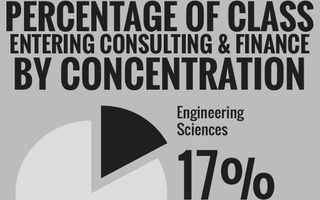As far as local economic stimulus goes, $60 million is not bad. That lofty figure is the combined sum that U.S. Senate candidates Elizabeth Warren and Scott Brown have raised this for their campaigns this election cycle. Temporary boons to ad companies and political consultants aside, it is hard to see how this excessive spending benefits anybody in the long run. The Brown-Warren race demonstrates the absurdity of our current campaign-finance system. At this point, all the airtime is bought up, the radio-waves are saturated, and there’s hardly a voter in the Commonwealth who couldn’t recite each candidate’s pitch by heart. Our current system of private campaign finance is a wild misallocation of resources that simply raises prices for consultants and ad production companies without any perceptible benefits for voters. We advocate widespread public finance reform, putting an end to this inefficient system.
Needless to say, $60 million is far in excess of the socially optimal campaign cost for a single senate campaign in a state with only 4.2 million registered voters. That breaks down to almost $15 in campaign spending per registered voter—a candidate could probably purchase votes directly for less. What’s more, it’s far in excess of the average cost of a senate seat. From 1986 to 2010, average campaign expenditure on a senate seat hovered between $5 and $10 million—well below the roughly $30 million per candidate this cycle.
At its current level, it’s not even clear that this much fund raising is benefiting the candidates. As political consultant Tom Domke notes, “There’s only so much TV or radio time they can buy.” Indeed, private campaign finance has all the trappings of an arms race: Each party ups its arsenal of campaign funds for fear of being outspent without a clear advantage to either party. The result is that an inordinate amount of money is funneled into an activity whose only intrinsic value is, at best, making voters aware of candidates’ platforms. In practice, insofar as this goal is fulfilled at all, it can happen well below $60 million dollars.
Even if we choose not to approach the question of whether it is right for candidates with deep-pocketed donors to have an advantage in getting their message out, it’s hard to see how the current system benefits either party. Going into a race, it’s often hard to predict who will have the final cash advantage. Although Republicans are known for garnering donations (sometimes indirectly) of jaw-dropping proportions, Democrats have certainly held their own. In 2008, then-Senator Obama enjoyed the cash advantage, and he may well out-raise his opponent again. If neither party is the clear winner in the private fundraising rat-race, it’s hard to see why either would be against widespread public finance reform.
Of course, the great elephant in the room on this topic is Supreme Court precedent. Current case law holds that money is equivalent to speech, a fact which makes campaign finance reform nearly impossible. While we support public finance, it would need to come part-and-parcel with a constitutional amendment reversing that line of precedent.
Read more in Opinion
Looking in the MirrorRecommended Articles
-
Our Democracy Is Broken, But We Can Fix ItIndeed, in the wake of Citizens United and years of weak campaign finance laws, there is a lot we do not know about how our elected officials reached our TVs, our YouTube videos, and our ballots in the endless campaign leading up to Tuesday, November 6
-
Bonfire of the VanitasBut, I feel I finally need to draw the line with one specific aspect about Harvard’s finance culture: the pervasive atmosphere around campus that upon graduation, banking and consulting are the only “real jobs” and everything else is a failure.
-
The Legacy of the Super ColliderTwenty years ago, on October 19, 1993, the US House of Representatives voted 264 to 159 to reject further financing for the Superconducting Super Collider, the particle accelerator being built under Texas.
-
 Pursuing Passion? Selling Out? Buying Time?
Pursuing Passion? Selling Out? Buying Time? -
Thank You, OCSWe applaud OCS for its success at linking students to these specific career opportunities. The primary concern of most upperclassmen here is securing employment post-graduation, and it is impressive that 18 to 22 percent of the student body manage to consistently land jobs in consulting and finance.
-
UC Addresses Budget ConcernsUndergraduate Council representatives raised concerns with the current state of UC finances at Sunday’s general meeting.













